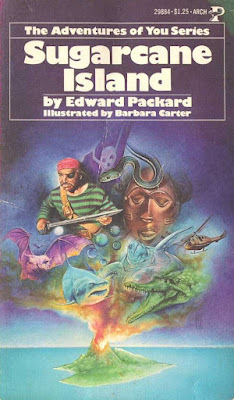Retrospective: Sugarcane Island
 It's funny the memories that stick with you, even after so many decades. When I was in the third grade, my teacher invited a public librarian to come and visit our classroom. The purpose of his visit was twofold. First, he wanted to encourage us to come to our local library to get library cards (I needed no encouragement in this regard, having been an avid visitor of public libraries since I was quite young). Second, he wanted to share with us some books that he thought we might like. I cannot recall most of the books the librarian recommended to us on that day, but one still stands out: Sugarcane Island by Edward Packard.
It's funny the memories that stick with you, even after so many decades. When I was in the third grade, my teacher invited a public librarian to come and visit our classroom. The purpose of his visit was twofold. First, he wanted to encourage us to come to our local library to get library cards (I needed no encouragement in this regard, having been an avid visitor of public libraries since I was quite young). Second, he wanted to share with us some books that he thought we might like. I cannot recall most of the books the librarian recommended to us on that day, but one still stands out: Sugarcane Island by Edward Packard.Context is important here. The librarian's visit probably took place in the spring of 1978. At that time, no one had ever heard of a Choose Your Own Adventure book. That famous series didn't even come into existence until 1979, shortly before I first encountered the D&D Basic Set. Consequently, when the librarian described Sugarcane Island as a book in which I, the reader was the main character (or words to that effect), I was simultaneously baffled and intrigued. I'd never heard of a book like that and my eight year-old brain initially struggled to understand what he meant. It was only after he'd read a portion of it to us and allowed our class – by majority vote! – to decide which choices to make in the unfolding narrative that intrigue won out over bafflement. I had to read this book for myself.
I eventually was able to snag a copy of Sugarcane Island at the library, along with Deadwood City, another proto-CYOA book by the same author. The premise of Sugarcane Island is that the reader is an assistant to a scientist on an expedition to the Galapagos Islands made famous in the English-speaking world by the voyage of Charles Darwin aboard the HMS Beagle. The ship on which you are traveling encounters a bad storm during the night, resulting in your being washed overboard. When you wake up the next morning, you find yourself on the beach of a strange island, the only distinguishing feature being the sugarcane that grows nearby, hence the title of the book.
The "story" of Sugarcane Island is thus one first of survival – you must locate food, water, and shelter – and then of discovery and escape. Your choices determine where you go and what find on the island and that alone was intoxicating to me as a child. I'd never read a book that allowed me to decide where the protagonist went and what he did. That alone was enough to get me to read through it several times in the span of a single day, making different choices each time, trying to see what the "best" course of action was. That was the real appeal of Sugarcane Island for me: it was like a game.
Eventually, though, I found the limited choices and occasionally arbitrary nature of outcomes to be frustrating. The book's promise of open-endedness was somewhat illusory and it quickly became clear that Packard had decided in advance that there were "right" and "wrong" decisions. That's perfectly understandable, of course, given the inherent limitations of a printed book. Indeed, that's one of the difficulties of all Choose Your Own Adventure Books and their modern descendants, such as computer RPGs: there's simply no practical way to consider every possible choice. Sure, the author can include the most obvious choices and options and, for most readers, that's probably enough. But what if you want to do something unexpected or even downright weird? In that case, you're out of luck.
As I believe I've mentioned elsewhere, I was not a big reader of Choose Your Own Adventure books (aside from the excellent Fighting Fantasy books). To a great extent, this is simply a factor of history: most of the volumes released under that banner didn't come out until after the time I was already playing roleplaying games and they paled in comparison to the fun I had playing D&D or Gamma World. At the same time, it's not incorrect to say that Sugarcane Island paved the way for my eventual embrace of RPGs. In a very real sense, this book made me aware of a desire I didn't even know I had, namely, to determine the choices a protagonist makes in an unfolding story. That Sugarcane Island failed to satisfy that desire fully is no knock against it, which was (and is) a genuinely groundbreaking children's book. I'm very grateful to that nameless librarian who visited my school more than four decades ago. Without him, who knows whether I'd ever have become involved in this hobby that still gives me so much joy more than four decades later?
James Maliszewski's Blog
- James Maliszewski's profile
- 3 followers



